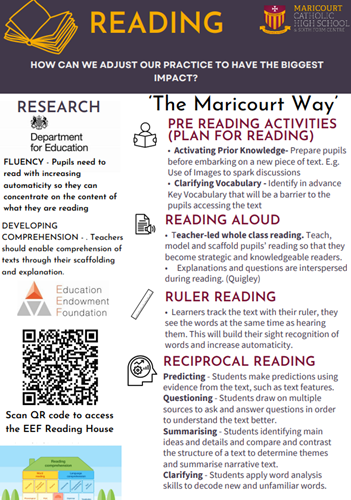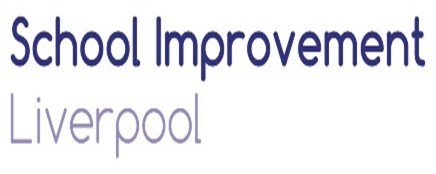Literacy at Maricourt Catholic High School
- Here at Maricourt, literacy is embedded into all aspects of school life. Covering all three aspects of reading, writing and speaking & listening, we want our students to thrive in an educational environment that encourages a cross curricular application of all subjects.
- ‘Every student a reader’
- Universal classroom approaches for all students “Literacy, the Maricourt Way”
- Literacy intervention for students in need of additional support
- Upon entry to high school, Year 7 students reading ages are tested, this test is repeated at the end of the academic year and at the end of every academic year thereafter.
Why reading matters:
- It is a simple truth: Successful reading helps determine academic success. Reading proves “the master skill of school”.
- Reading is critical to support academic transition.
- Regular reading is proven to:
- Improve mental health.
- Increase confidence.
- Improve your child’s chances of getting better grades in all subjects; and improve career prospects in later life.
- Improve vocabulary, spelling, writing and speaking skills.
- Develop imagination, empathy and critical-thinking skills.
- Those who read for just 30 minutes per week are more likely to report greater life-satisfaction and self-esteem.
- Reading improves academic outcomes in ALL subjects – interestingly the positive impact on test scores in Maths is even higher than that in English Literature or History.
Parent challenge:Can you set aside 10 minutes per day to dedicate to ‘reading for enjoyment’ with your child?#10minchallenge
We recommend the following websites to support your child reading at home:
https://literacytrust.org.uk/ , https://www.literacyshed.com/, https://wordsforlife.org.uk/parent-support/
The importance Developing pupils’ language capabilities
For full comprehension of a text, a student must understand 90-95% of the vocabulary, and so this is the first step to accessing high quality informational texts (including exam papers)
- On average teenagers hear just 100 word families (e.g. run, running, ran, runs) approximately 50% of the time in spoken language
- It is important therefore that young people hear, understand and are able to use a wide range of general academic words – As such, our teaching prioritises the teaching of core vocabulary as an essential part of a knowledge-rich curriculum. To maximise this even further, consider using more academic words when talking to your child.
Literacy Across the Curriculum
Research suggests that 14-year olds who read often and independently know 26% more words than those who never read. Not only this, knowing a range of high-quality academic vocabulary also improves reading skills.
Therefore, in lessons teachers promote subject-specific vocabulary, encouraging students to use the academic words that are essential for that subject and follow a common approach to reading.

Departments have also created a list of book recommendations for pupils to engage in wider reading across their subject areas.
Business and Economics Reading List
Design and Technology Reading List
Reading Interventions:
Read, Write Inc: Fresh Start Programme

Led by trained teaching assistants, Read Write Inc. Fresh Start is a catch-up and intervention programme with proven results, for 9 to 13-year-olds still learning to read. It offers a simple but powerful solution to accelerate reading progress. Fresh Start teaches students at their challenge point, so they learn to read accurately and fluently. They will also develop good comprehension, spelling and punctuation skills through targeted activities.
The Reading Development Programme

The School Improvement Liverpool - Reading Development Programme targets pupils who lack the basic reading, academic vocabulary and the comprehension skills necessary to fully access and engage in the secondary curriculum.
Reading For Pleasure
As an enriching centre of both learning and reading, Maricourt's Library is an essential part of our school community and we are extremely fortunate to have a Library on both of our school sites. Each Library houses a variety of books within several genres, there is something for everyone depending on your taste. With a section of Newman library dedicated to offering higher academic reading resources, we encourage our six form students to use these in their studies or to just explore a particular topic if they so wish.

